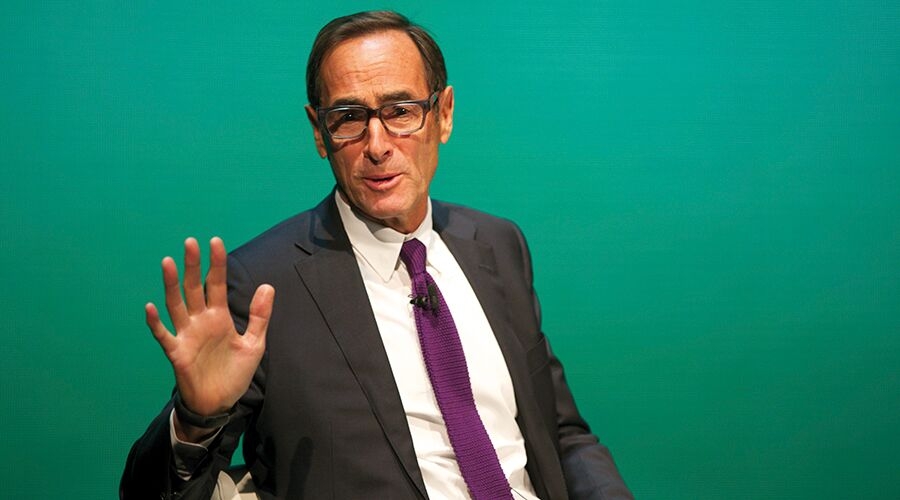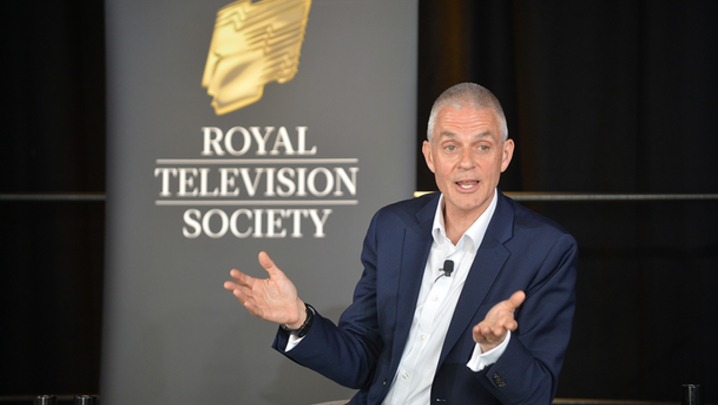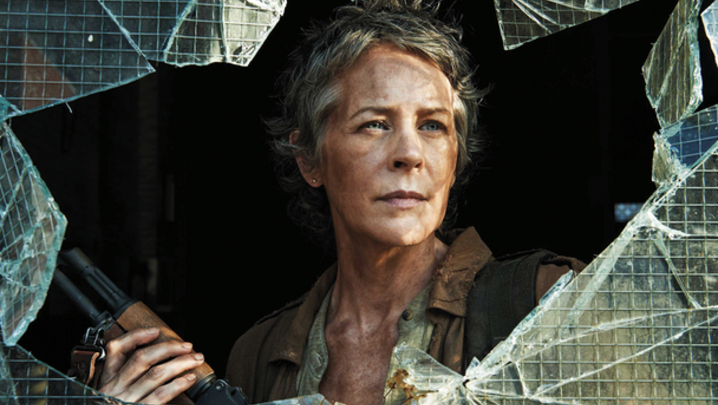Cambridge Convention 2015 Session Five: Josh Sapan, head of AMC Networks, explains how the BBC inspired him to make shows like Mad Men, Breaking Bad and The Walking Dead.
Josh Sapan was welcomed as “the real deal, one of the greats of American cable and the television industry” by his interviewer, Tim Davie. Not only that, the audience learned that Sapan was cut from a different cloth to most US TV executives because he understood British humour.
That’s germane because Sapan, President and CEO of AMC Networks, landed a 49.9% stake in BBC America (for $200m) in October 2014.
“We are cousins of the BBC, married into the family, a delight for me,” said the donnish-looking, New York-based cable veteran.
After a stirring opening showreel, spanning his acclaimed hits, Mad Men, Breaking Bad, The Walking Dead and the BBC co-production The Honourable Woman, Sapan added: “We now have the opportunity to do more and more.”
The Honourable Woman was “the sort of material we revere. It is a spectacular piece of television.” Creator Hugo Blick was sitting opposite him in the front row, drinking it up.
The session was chaired by Sapan’s British business partner, Davie, who is Chief Executive of BBC Worldwide. Sapan lived up to his billing, if one judges by decibels of laughter. He also packed two (amusing and justified) comedy clips into the half-hour session.
First came a clip that confirmed that his Mad Men gamble had succeeded: a spoof Don Draper guide to picking up women. “You know things are going well if they are parodied by the mothership of parody, Saturday Night Live,” said Sapan with a smile.
This was followed by characters from the sketch series Portlandia bingeing on Battlestar Galactica to the point where one is sacked for watching the show when she should have been at work. “That’s how we want to see all people behave,” quipped Sapan.
Davie claimed that, these days, “everyone is having to partner. Selling 49% of BBC America was not something we would have contemplated a few years ago”, but AMC was seen as an ideal partner for just such a deal.
That was because Sapan had led the transformation of AMC from a classic movie channel to its present incarnation. Davie hailed this as “one of the great, or greatest, transformations probably in television history”.
Davie went on to ask how Mad Men and then Breaking Bad had come about. Sapan deadpanned: “Simple... you just choose a handsome guy who won’t stop, and a guy into crystal meth!
“I don’t think we have any magic sauce at all. We were probably a little bit early into doing things that, frankly, the BBC had always done: pay attention and revere crafted, quality stories. It was zig if they are all zagging. The BBC does material for the wonder of the material.”
American television, however, “is a business of numbers. For the most part, the life expectancy for a show… is determined in two to three weeks.
“So we have a structural opportunity (because of cable’s dual revenue stream) to not necessarily have to get the audience – bang! – in the first minute of the first episode or first two episodes. What those shows have a bit in common is they really do build.”
Sapan added: “Matthew Weiner famously walked around with the Mad Men script in his briefcase for seven years and nobody would touch it because, if you read it, it reads quiet.
“I brought it to three people I trusted before we made it. They all went: ‘Way too quiet, Teflon people, no one will stay.’
“That’s a little bit true about Breaking Bad, also famously rejected by multiple networks. Walking Dead was passed on, too. So we went for things that were different.
“I put the credit for shows clearly in the hands and laps of the people I work with. And if I have a contribution to all this, it is in creating an organisation where people feel… comfortable enough to take risks,” explained the self-deprecating Sapan. “People love what they do, so they are working way overtime in their heads.”
Davie moved on to 5 August, when Disney’s ESPN pay-TV network reported a drop in subscriptions. This led to a sharp fall in US media stocks, including AMC, as fears of cord cutting spread.
Sapan said: “It was probably a bit of an overreaction. It did, however, reflect some of the things in the current system in the US. There is more consumption of streamed content away from linear networks, which is not insubstantial. And people have the means to defeat advertisers: they can bypass them on their DVRs.
“We take all that stuff very seriously. It is an evolution, in technology patterns and consumption, and explains our interest in owning content, as opposed to leasing content. That allows us to operate, effectively, as a studio.”
However, he qualified this by adding: “Because we are driven by the creative, if it’s a great show, then we will lease it. But we prefer to own it if we can. We can then export it. Priorities one, two and three are creative, creative, creative. They really are.
“Frankly, what brought us to the BBC is the reservoir of what you own and… what we know is going to happen in the future. Our personal favourites are what inspired us.
“We talk about Luther, Broadchurch, Doctor Who, Top Gear. You guys were, for us, the godfathers. You’ve had the playbook for much longer than us and have shown that it works.
“So that is what we are doing: owning, adding channels around the globe, diversifying our business model.”
Sapan was then pressed for his view on Netflix, a client for AMC-produced programming.
His conclusion: “Friend and foe, and I don’t think the final diagnosis is yet in. Mad Men, Breaking Bad – one could theorise that the availability of past seasons [on Netflix] helped people sample [the shows], bringing them to the new season.
“There is also an argument that they could be the companion that eats you and you no longer become necessary.” AMC plans to sell some shows to Hulu, as well as to Netflix.
In a consolidating media, asked Davie, was mid-ranking AMC too small?
“It is less critical by a long shot on the content side because – we’re a bit of a test case – we have had a great run. And the why is because we have great stuff and the stuff has risen up without us being bigger,” replied Sapan.
He added: “You can’t dictate to people what to like, you have to have the show they really, really want.
“You had better be the people’s candidate. There is a truly democratising trend caused by social media.
“Therefore, you can be a small player and can strike magnificently and have everybody following you.”
Sapan pointed out that audience data worked extremely well on the marketing side. But “on the decision about what to make… others have tried to use data to say, ‘Good show, bad show…’ It’s been a goddamn disaster.
“You can’t number your way to greenlighting a show, and you can’t get the data that tells you how to fix a story. It just doesn’t seem to work. Numbers are not knowledge.”
Josh Sapan, President and CEO of AMC Networks, was interviewed by Tim Davie, CEO of BBC Worldwide. The session was produced by Charlotte Elston.




